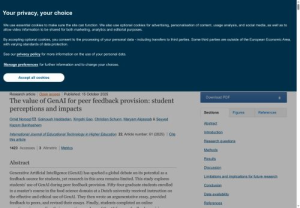The value of GenAI for peer feedback provision: student perceptions and impacts | International Journal of Educational Technology in Higher Education | Full Text
Generative Artificial Intelligence (GenAI) has sparked a global debate on its potential as a feedback source for students, yet research in this area remains limited. This study explores students’ use of GenAI during peer feedback provision. Fifty-four graduate students enrolled in a master’s course in the food science domain at a Dutch university received instruction on the effective and ethical use of GenAI. They then wrote an argumentative essay, provided feedback to peers, and revised their essays. Finally, students completed an online questionnaire regarding their perceptions and use of GenAI for peer feedback provision. Descriptive analyses were applied to survey data and comment data were coded quantitatively for the presence of comment features. The results revealed that just over half of the students chose not to use GenAI for peer feedback provision, primarily because they believed they would learn more by completing the task independently. The remaining students used GenAI to improve both high-level and low-level aspects of their feedback, and most of these students found GenAI to be moderately helpful for peer feedback provision. In terms of its impact on the peer feedback content, students who used GenAI provided more suggestions for high-level issues and offered less mitigating praise for low-level issues compared to those who did not use GenAI for peer feedback provision. These results offer valuable insights for the design and adoption of GenAI tools to enhance peer feedback practices.
Selected text: The remaining students used GenAI to improve both high-level and low-level aspects of their feedback, and most of these students found GenAI to be moderately helpful for peer feedback provision. In terms of its impact on the peer feedback content, students who used GenAI provided more suggestions for high-level issues and offered less mitigating praise for low-level issues compared to those who did not use GenAI for peer feedback provision
